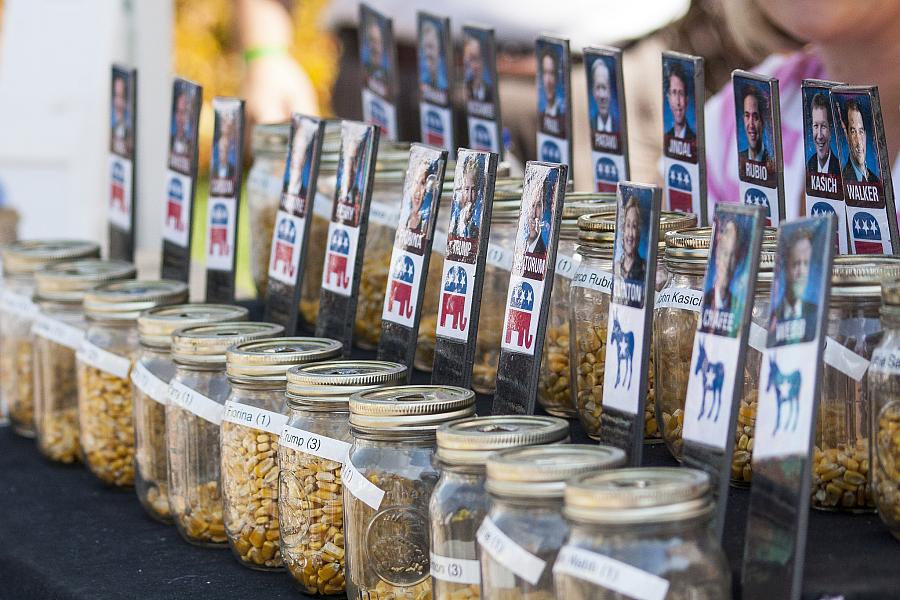Access Denied: Government secrecy should be hot topic among presidential candidates

The corn kernel poll at the Iowa State Fair.
On Feb. 1, 2016, Americans will have the first official vote indicating who might become the next president.
At the Iowa caucuses, Iowans will decide between Hilary, Bernie, and Martin. They’ll decide between Ben, Donald, Marco and the long list of rivals.
Previewing all of the contests and documenting all of the political nuances will be one of the country’s oldest and most politically astute newspapers: The Des Moines Register.
And what is the Register presenting to the world as the big issue of the day in Iowa? What should contestants hoping to win over Iowa voters be prepared to address when they tour the state?
Government mistrust.
The Register’s editorial board recently wrote: “Was there ever a time when the American public was more distrustful of the government?”
Presidential candidates — especially on the Republican side — make a lot of hay with this one. And they should. Polls repeatedly show that people trust their public officials and government agencies less and less. (One can debate, of course, whether this mistrust is largely a byproduct of unsupported claims by many of the same politicians now benefiting from the public’s mistrust.)
And what does the Register cite as a big driver of that mistrust?
Government secrecy. Yet the presidential candidates spend a lot of time talking about immigration laws, Obamacare, and the “war on Christmas.” If they do talk about government secrecy, it’s more narrowly focused on something like the terrorist attacks in Benghazi, Libya. But people are concerned about secrecy of the more mundane kind.
The Des Moines Register editorial board wrote:
Government secrecy and public distrust go hand in hand. They feed on each other. And that may help explain why Iowa politicians, despite their fatuous claims of openness and transparency, are actually so contemptuous of ‘the public’s right to know.’ … At a time when government agencies are increasing their collection of information on the public, and are doing so at the public’s expense, they are also closing down access to that information. We’re being billed millions of dollars for the ‘privilege’ of being kept in the dark by people supposedly working on our behalf.
The Register provides a litany of sins against the public’s right to know. Iowa is on the hot seat, but the violations of basic democratic principles can be applied to states from coast to coast. These are the things that the candidates should spend time on. I’m going to write about some of the issues the Register raises in a few posts, beginning with what should be an unforgiveable sin for any public agency.
Denying people access to records but charging them anyway.
Have you ever had to pay for copies of public records only to receive a stack of papers that had been so heavily redacted as to make them unreadable? In Iowa, the Register notes that government records are presumed open unless there is a specific state law that denies people access to that particular record. To get around that law, agencies in Iowa tell citizens that they have to conduct a legal review to decide whether the records are barred from public access by a law. And, just for asking, the citizens are charged a fee for the review. The Register rightly calls these “fees for non-disclosure.”
Blocking access with no justification.
Have you ever been told that you could not have a copy of a record you thought was or should be public and then asked, “Why?” Sometimes you are provided a copy of a state or local law that, no matter how frustrating, at least provides a black-and-white reason for the denial. Other times you are told nothing. As the Register wrote, “If a citizen insists on being given the specific legal rationale for withholding each piece of requested information, the specter of additional fees is raised.”
This actually happened to the Register. The newspaper asked for state records related to Medicaid fraud. The paper did receive records, but the records were full of redactions. The editorial board wrote:
When the Register protested, state officials said providing the legal basis for those redactions would require ‘additional administrative time’ that could then be billed to the newspaper.
The Register’s headline says it all: “Iowans pay millions to be kept in the dark.” That’s what candidates for elected office should be talking about if they want to tap into the real reasons for government mistrust. Most people are not nearly as affected by something that happens on the border or in a distant country as they are by things that happen in their everyday lives.
I’ll write more about other ways that secrecy is leading to mistrust in my next post.
[Photo by Phil Roeder via Flickr.]
Related post
Access Denied: Going digital should open more records to the public

